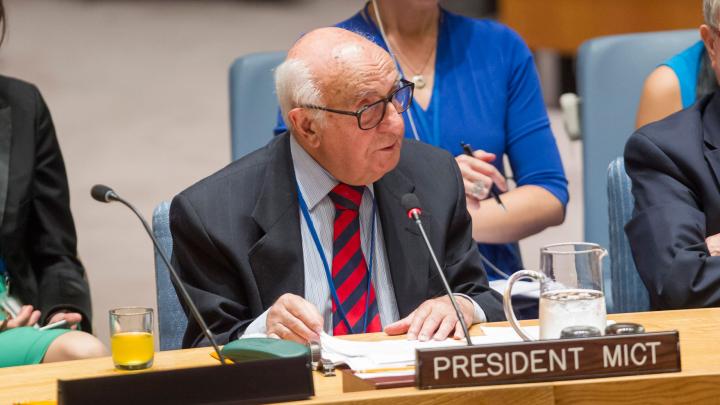President Meron’s address to the UN Security Council

The President of the Mechanism for International Criminal Tribunals (MICT), Judge Theodor Meron, today addressed the United Nations Security Council to present the latest six-month progress report on the work of the Mechanism.
The President noted that, in the reporting period, the Mechanism assumed responsibility for the retrial in the case of Jovica Stanišić and Franko Simatović, as well as for appeal proceedings in the cases of Radovan Karadžić and Vojislav Šešelj.
In addition, during this reporting period, the Mechanism’s Judges issued nearly 200 decisions and orders on a wide array of matters, ranging from requests to provide assistance to national judicial authorities to applications alleging contempt of court. The President stressed that the Judges carried out their work from remote locations around the world “carefully, diligently, and to the highest possible standards.”
Turning to other areas under the Mechanism’s responsibility, President Meron noted the seamless transition of the remaining functions from the International Criminal Tribunal for Rwanda (ICTR) to the Mechanism following the ICTR’s closure in December 2015. The President also briefed the Security Council about the progress of the new premises of the Arusha branch, confirming that the project is nearing completion. In this regard he expressed his deep appreciation for the support of the Government of the United Republic of Tanzania, as well as the assistance from various offices of the UN Secretariat.
The President added that important progress had been made in several other areas of the Mechanism’s work, including continuing the transfer of records of the ICTR and the International Criminal Tribunal for the former Yugoslavia to the Mechanism, enhancing access to these records, as well as further improving processes related to the provision of assistance to national jurisdictions. President Meron also expressed his gratitude to the Government of the Netherlands, noting that legislation had been passed in the Netherlands providing domestic legal effect for the provisions of the Mechanism’s Headquarters Agreement there and noted that entry into force of the Agreement itself is near.
Commenting on the arrest of the ICTR fugitive Ladislas Ntaganzwa last December, President Meron confirmed that Mr. Ntaganzwa had been transferred to Rwanda in March 2016, consistent with the referral of his case by the ICTR. He added that the Mechanism was already monitoring the proceedings, in accordance with its Statute and thanked the monitors from the Kenyan Section of the International Commission of Jurists for their assistance in this regard. The President underlined the importance of continuing to track the remaining eight ICTR fugitives and reiterated that “sustained support and involvement of Member States in relation to these tracking activities is essential if we are to ensure that the remaining fugitives are apprehended.”
In addition, President Meron announced the newly signed enforcement-of-sentences agreement with the Republic of Mali, while urging other States to enter into such agreements in order to “expand the Mechanism’s critically important enforcement capacity.”
The President drew attention once again to the increasingly urgent situation related to the relocation of a small number of individuals in Arusha who were either acquitted by the ICTR or who have served their sentences imposed by the Tribunal, calling it a “long-standing humanitarian challenge”, and observing that the Mechanism remains dependent on the international community to help resolve the situation.
In concluding, President Meron stressed that “this Council has my pledge that we will continue to encapsulate and promulgate best practices, to innovate wherever possible, and to seek ever greater efficiencies whilst never forgetting our fundamental role as a court or the terrible atrocities that led to our establishment. In doing so, I am confident that the Mechanism will not only fulfil its responsibilities to its predecessor tribunals, to affected communities in Rwanda and the former Yugoslavia, to courageous victims and witnesses, and to this Council [but] do so to the highest possible standard.”